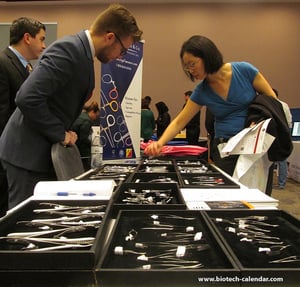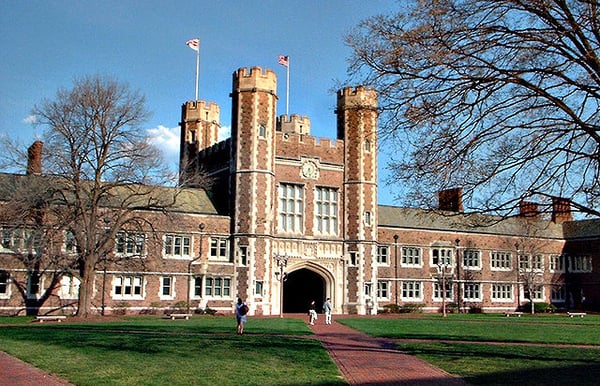Are you looking to increase laboratory product and equipment sales in Michigan this February?
Selling Lab Equipment
Tags: Michigan, BioResearch Product Faire, Virtual, 2021
New research at Washington University School of Medicine in St. Louis is aimed at investigating whether an already FDA-approved medication is effective in preventing hearing loss. The anti-seizure drug, zonisamide, is being evaluated. In the trial, the drug will be given to police officers and skull surgery patients before being exposed to loud noise. Zonisamide has previously been shown to lessen the damaging effects of hearing loss in animal trials and is typically given as a safe drug for epilepsy with minimal side effects. The project received a $10.5M grant from the Department of the Army and will be led by Washington University in collaboration with the University of Texas at Dallas, the University of Akron, Ohio, and Gateway Biotechnology in St. Louis.
Hearing damage, specifically hearing loss and tinnitus (ringing in the ears), is the most common disorder effecting members of the military. This research is intended to impact and improve quality of life for military members and their families.
This study is just one of more than 3,000 research projects underway at Washington University. Another includes the $18.5M National Institute of Health (NIH) funded Dominantly Inherited Alzheimer Network Trials Unit (DIAN-TU), a clinical trial testing multiple drugs to slow or block the development of Alzheimer’s disease in individuals inherently at risk. Additionally, Rodger and Paula Riney charitably donated another $15M for Alzheimer’s and Parkinson’s research, making Washington University a significant contributor in neurodegenerative and aging research along with other universities, such as the University of Southern California (see link: http://info.biotech-calendar.com/usc-recieves-13.98m-for-alzheimers-clinical-trial-consortium ).
Public Domain, https://commons.wikimedia.org/w/index.php?curid=505622
Washington University School of Medicine is one of the largest life science-focused recipients of NIH funding Nationwide. In the 2017 fiscal year, Washington University received the highest R&D funding it has in the course of the past decade, with $672M of the $754.4M total R&D being in Life Science expenditures.
Later this spring Biotechnology Calendar, Inc. looks forward to hosting its 20th annual BioResearch Product Faire™ event at Washington University. The event will take place Friday, April 19th, 2019.
If you are looking to sell lab research products to this marketplace, consider these facts:
- 2017 Total R&D: $754,462,000

- 2017 Life Science R&D Expenditures: $672,672,000
- Ranked 28th in the nation for Total R&D Expenditures
- 31 International research partnerships
- Over 3,000 research projects underway
Last year's show was a great success. We had a total of 338 attendees of which 120 were professors, post docs and purchasing agents. 57 attendees were lab managers with the remaining balance being both research associates and postgraduate students. This event is the perfect place to network with life science researchers and laboratory suppliers. We hope you will join us at the upcoming Washington University BioResearch Product Faire™ event.
Washington University BioResearch Product Faire™ event - April 19th, 2019
Read More
Tags: WashU, National Science Foundation, BioResearch Product Faire, WashU researchers, Department of the Army, Science News
Tags: Washington University St. Louis, Bioresearch funding, Biotechnology vendor show, Washington University, WUSTL, BioResearch Product Faire, Birth Defects, Pediatric Neurology, Translational Science
According to the NIH, "Genomic medicine is an emerging medical discipline that involves using genomic information about an individual as part of their clinical care (e.g. for diagnostic or therapeutic decision-making) and the health outcomes and policy implications of that clinical use."
In 2018, Duke University was awarded six grants from the National Human Genome Research Institute, a part of the NIH. Two of the grants will total about $9 million over the next 5 years. The first grant establishes the Duke Center for Applied Genomics & Precision Medicine. The second supports a Duke initiative to gather the family medical histories of low-income patients and assess their inherited risk of certain diseases.

(Image courtesy of Shutterstock)
Read MoreTags: Duke University, genome research, sell lab products, Research Funding, laboratory equipment, Duke University Health System, NIH grants, BioResearch Product Faire, duke medicine, Genome Analysis, general lab supply, gene therapy and genome editing, nih research funding
Nearly one million American’s live with Parkinson’s Disease (PD). The direct and indirect costs of Parkinson’s, including treatment, social security payments and lost income, total nearly $25 billion per year in the United States. Medications alone average $2,500 per year per patient. Currently, there is no definitive test for PD and, while there are treatments, there is no cure. With the help of over $7.7 million in NIH funding, the Director of the Morris K. Udall Parkinson’s Disease Research Center at Johns Hopkins, Ted Dawson M.D., Ph.D. hopes to change that.
Read MoreTags: Johns Hopkins University, Baltimore, new research grant, Parkinson's Disease, BioResearch Product Faire, nih research funding, university research funding, JHU
According to the Mayo Clinic, stress can cause a number of health issues including high blood pressure, heart disease, obesity and diabetes. A new University of Georgia, Athens (UGA) study is being funded by the National Institutes of Health (NIH) to show how stress affects children’s immune system. This $2.3 million, Director’s New Innovator Award, will allow researchers to correlate acute stress with how children’s immune systems respond to vaccination.
Read MoreTags: biomedical research, University of Georgia Athens, influenza research, University of Georgia, immunity, UGA, chemical supply, laboratory equipment suppliers, lab suppliers, stress, BioResearch Product Faire, Laboratory product sales, Biotechnology trade show, university research funding
Half of all sexually active young people will acquire a sexually transmitted disease by the age of 25. According to the Center for Disease Ccontrol (CDC) there are 20 million new cases of sexually transmitted infections (STI) each year. There are more than 110 million Americans currently living with a STI. The direct medical cost to the U.S. healthcare system from these infections is nearly $16 billion every year. Researchers at Johns Hopkins University recently received a $5.1 million National Institutes of Health (NIH) grant to develop a faster and more accurate diagnostic tool for STIs. This device could radically change how sexually transmitted infections are tested and treated.
Read MoreTags: Johns Hopkins University, Baltimore, new research grant, STD Research, BioResearch Product Faire, Bacterial Cell Research, nih research funding, university research funding, Kansas research
The Dolby family is a longtime supporter of UC San Francisco. In 2015, the Ray and Dagmar Dolby Family Fund gifted UCSF’s Department of Psychiatry $20 million to support research on mood disorders and treatment programs. Now Dagmar Dolby and her son David are donating another $20 million to the university to launch the UCSF Dolby Family Center for Mood Disorders. Faculty and clinics under this new center’s umbrella will be housed in either of two state-of-the-art buildings under construction on the Mission Bay Campus: the Child, Teen and Family Center, which will also house the Department of Psychiatry, and the Joan and Sanford I. Weill Neurosciences Building.
Read MoreTags: University of California San Francisco, sell lab products, Psychiatry, Research Funding, UCSF, laboratory equipment suppliers, Lab Product Sales, UC San Francisco Parnassus, BioResearch Product Faire, clinical and translational research funding, new building construction, Psychological Disorders, sfvs18s, new science buildings
In 1980 the U.S. population was 226.5 million; by 2015 it reached just over 321 million. By 2050 the U.S. population is projected to reach nearly 400 million. That’s roughly 80 million more mouths to feed. The USDA recently awarded the University of Georgia, Athens $5,000,000 to conduct research into making indoor farming a more feasible solution to this looming crisis. At present operating an indoor farm is comparatively costly. Up to 60% of the cost goes to energy and half of that is for lighting.
Read MoreTags: biomedical research, University of Georgia Athens, University of Georgia, UGA, chemical supply, laboratory equipment suppliers, lab suppliers, BioResearch Product Faire, Laboratory product sales, agricultural business, agribusiness, Biotechnology trade show, Agricultural Biotech, university research funding
The Cancer Prevention and Research Institute of Texas (CPRIT) awarded more than $9 million in research grants to Texas A&M University. Of the $9,057,870 in funding from CPRIT, more than $7.7 million is for academic research and $1.35 million is for a prevention grant. Eight grants were awarded by CPRIT. The largest was $5,793,075 to the recently established Center for Advanced Microscopy and Image Informatics (CAMII) in the Institute of Biosciences and Technology, College of Medicine.
Read MoreTags: TAMU, Biotechnology Vendor Fair, Texas A&M Research, Texas A&M Life Science Funding, biotech vendor show, Texas A&M, Research equipment, cancer researchers, cancer research grant, laboratory suppliers, BioResearch Product Faire, medical marijuana, colon cancer




